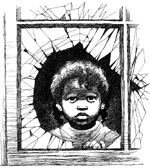



University Study Finds That a Young Child’s Environment Can Have a Major Effect on Scores on Standardized Tests Later in Life
 A study by university researchers published in the Proceedings of the National Academy of Sciences finds that growing up in a poor neighborhood is equivalent to missing one year of schooling during the K-12 years. Researchers at Harvard, New York University, and the University of Chicago have found that children who grow up in these impoverished communities have a lower level of verbal skills. This disadvantage holds as the children grow older. Later in life, when these children are given verbal reasoning tests, they score on average four IQ points lower than other children. This, according to the researchers, is equivalent to one year of schooling.
A study by university researchers published in the Proceedings of the National Academy of Sciences finds that growing up in a poor neighborhood is equivalent to missing one year of schooling during the K-12 years. Researchers at Harvard, New York University, and the University of Chicago have found that children who grow up in these impoverished communities have a lower level of verbal skills. This disadvantage holds as the children grow older. Later in life, when these children are given verbal reasoning tests, they score on average four IQ points lower than other children. This, according to the researchers, is equivalent to one year of schooling.
Furthermore, the disadvantage for children who grow up in impoverished neighborhoods persists even for those who move out of these neighborhoods.
Researchers also examined not only socioeconomic factors but also racial differences. However, they concluded that “the social worlds of black and nonblack children are so different that comparable cases across race could not be found to assess the combined effect of disadvantage” among the 2,000 children who participated in the study.
This research adds great weight to the argument that racial and socioeconomic differences in test scores later in life have a great deal to do with the environment in which the test takers grew up.
![]()
Copyright © 2008. The Journal of Blacks in Higher Education. All rights reserved.